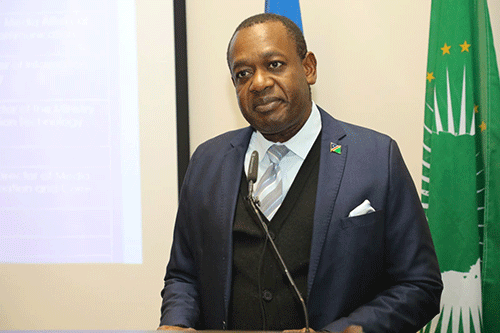Jairos Kangira
Namibia’s most avid scholar Peya Mushelenga, minister of information and communication technology bagged his second doctorate – this time a Doctor of Philosophy in Law – from the University of Western Cape, South Africa, on Wednesday last week, bringing to 12 the number of degrees he has harvested so far.
Mushelenga becomes the first academic to investigate the relationship between investigators and prosecutors with his PhD thesis, titled ‘Investigator-Prosecutor Collaboration, a Framework for Improving Namibia’s Criminal Justice Process’.
The thesis discusses the significance of inter-agency cooperation, with particular reference to Namibia, analysing models, principles and approaches of interagency cooperation to determine a suitable model for Namibia.
The study was based on research questions examining the trends in the Namibian criminal justice system, and the relevance of cooperation between investigators and prosecutors.
The findings of Mushelenga’s study are that prosecutors thoroughly read the dockets at every stage of the court procedure when the docket is received from investigators, but not during the investigation stage, except for crimes falling under the Prevention of Organised Crime Act, where prosecutors assist investigators from the initial stage of an investigation.
The study, thus, recommends for a given category of serious crimes to be specified in legislation, regulation and policies, where inter-agency cooperation is adopted, featuring a hybrid of communicative cooperation model for investigations initiated by investigators, and a coordination model for investigations ordered by the prosecution.
Such cooperation should further be realised within the framework of separation of powers that prosecutors should only guide the process.
Inter-agency cooperation should further be adopted upholding the principles of neutrality, legality, complementarity, efficiency, objective truth and well-founded conclusions.
In an interview over the weekend, Mushelenga revealed it is determination that drives him in his academic achievements.
“Nothing is impossible with determination and focus. From all my heavy schedules as a cabinet minister, member of parliament, part-time lecturer and family man, I find time to dedicate to my studies,” said Mushelenga
He said he dedicates his thesis to the memories of his maternal grandparents, who also double as his godparents, reverend David Shihepo (popularly known as Nadihokololwe) and Eva Tomas (affectionately known as GwaNakoonde).
Reverend Shihepo contributed to the development of the criminal justice process when he and his colleague reverend Vilho Mwadikange Kaulinge testified in Wood and Others vs Ondangwa Tribal Authority, and Another 1975 (2) 294 (AD) against the flogging of people with makalani tree branches, resulting in the discontinuation of that practice by the colonial administration in Namibia.
Going down memory lane, Mushelenga acknowledged the role played by his grandmother in inspiring his political activism when she opened up to him about Namibia’s liberation struggle at a tender age.
Last year, he graduated with his 11th degree, Master of Science (MSc) in Finance from the prestigious University of London.
His thesis is titled ‘Trends of Revenue Collections in Namibia Since Independence (1990-2020) and Their Impact on Economic Development’.
There is no doubt that Mushelenga remains a role model to many in academic circles and the youth.
Many people who complete their doctoral studies often say that they would not want to revisit their experiences. However, for Mushelenga, it seems the sky is the limit.


